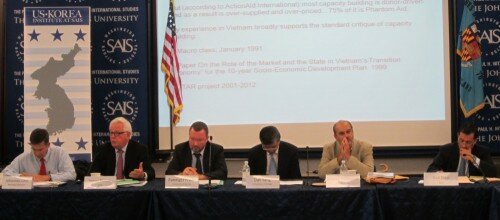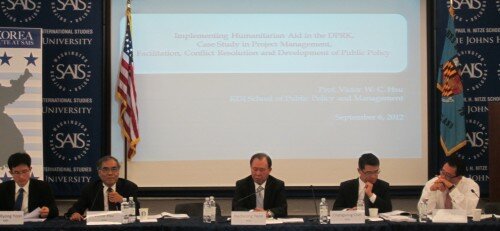On September 6, 2012 the US-Korea Institute at SAIS hosted a Forum on Development and Transition Economies at the Johns Hopkins School of Advanced International Studies. This was the first in a series of Forums that will coincide with ongoing research on these topics, with a special interest in how lessons learned can be applied to a North Korean context.
The goal of this research is to take a holistic approach to studying the experiences of transition countries. For the Republic of Korea, this research could not be more important or timely, considering the geopolitical ramifications of the recent change in the political leadership in North Korea. With this in mind, this research aims to contribute to the development of a framework for implementing policies and reforms in countries facing the prospect of transition.
In any transition scenario, whether it is sudden or guided, the government’s role, and the delivery of essential public goods will be fundamental to ensuring social and economic continuity. This first Forum will examine the role the government can and should play in guiding a transition process. Moreover, improving or rebuilding the government’s capacity to make policies and to administer them will be as important as identifying its appropriate role.
Vali Nasr, the Dean of SAIS, gave the opening remarks, after which two panel sessions followed:
Session I: Knowledge Sharing and Case Discussions on Capacity Building of Transition Countries

The first session focused on the transitional experiences of Vietnam, Germany, and China, all of which have gone through changes in their political systems as well as transitions to market economies.
Johannes F. Linn, the Senior Fellow at the Brookings Institute, was the moderator for the panel.
James Riedel, a professor at SAIS, gave an outline of how Vietnam transitioned to market economy, the role of capacity building in the process, and possible lessons for North Korea.
Rüdiger Frank, a professor at University of Vienna, drew from the case of East-West Germany unification and its aftermaths to put on the table some of the challenges and points to consider should the two Koreas reunify.
Dali Yang, a professor at University of Chicago, examined China’s past leadership transitions and development policy and assessed prospects for further reform.
Branko Milanovic, a principle economist at the World Bank as well as a professional lecturer at SAIS, was the discussant of the panel.
Session II: Drawing Lessons for Transition Countries – Issues on North Korea
 The second panel aimed to shed insight into the current conditions of North Korea’s political, economic, and social institutions, and how the initial state will affect the transitioning process as well as the reunification.
The second panel aimed to shed insight into the current conditions of North Korea’s political, economic, and social institutions, and how the initial state will affect the transitioning process as well as the reunification.
Jae Ku, the director at USKI, moderated this session.
Changyong Choi, a professor at KDI School, assessed the capacity of technocrats and economic professionals in North Korea primarily by analyzing the contents and the authors of Kyŏngje Yŏn’gu, a North Korean economics journal.
Hacheong Yeon, a professor at KDI School, presented his comprehensive study on the difference between the North Korean and the South Korean security systems and discussed the ways to integrate the two social security systems upon reunification.
Victor Hsu, a professor at KDI School, presented his research project that examined the capacity of the North Korean officials via surveys of international humanitarian workers who interacted with the officials.
Deok Ryong Yoon, a Senior Fellow at Korea Institute for International Economic Policy, was the discussant for this panel session.
For more information about this Forum, please contact , USKI Research Associate.



